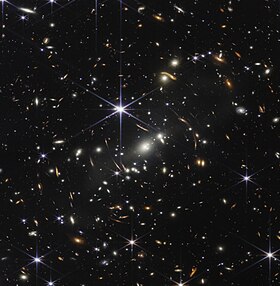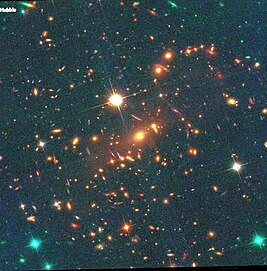SMACS J0723.3–7327
表示
(SMACS 0723から転送)
| SMACS J0723.3–7327 | ||
|---|---|---|

| ||
ジェイムズ・ウェッブ宇宙望遠鏡が撮影したSMACS J0723.3–7327。この画像は Webb's First Deep Field と呼ばれている。
(提供: NASA, ESA, CSA, STScI) | ||
| 仮符号・別名 | SMACS 0723 | |
| 星座 | とびうお座[1][2] | |
| 分類 | 銀河団 | |
| 位置 元期:J2000.0[3] | ||
| 赤経 (RA, α) | 07h 23m 19.5s[3] | |
| 赤緯 (Dec, δ) | −73° 27′ 15.6″[3] | |
| 赤方偏移 | 0.390[3] | |
| 視線速度 (Rv) | 95,303 km/s[4] | |
| 距離 | 約46億光年[1] | |
| 他のカタログでの名称 | ||
| PLCKESZ G284.99-23.70[4][5] | ||
| ■Template (■ノート ■解説) ■Project | ||
SMACS J0723.3–7327 または SMACS 0723 とは、地球からとびうお座の方向へ約46億光年離れたところにある銀河団である[2][6][7]。
概要
[編集]SMACS J0723.3–7327 が存在している領域は、地球の南半球から観測することができ、ハッブル宇宙望遠鏡や他の宇宙望遠鏡による深宇宙の観測がよく行われている[1]。ジェイムズ・ウェッブ宇宙望遠鏡 (JWST) に搭載されているNIRCamによって最初に観測・画像化された最初のフルカラー画像撮影のターゲットで、2022年7月11日にホワイトハウスでアメリカ合衆国大統領のジョー・バイデンなどが参加した特別プレビューイベントにて初めて公開された[1][8][9][10][11]。複数の波長での画像撮影に加えて、ジェイムズ・ウェッブ宇宙望遠鏡に搭載されている2つの機器を用いたスペクトル観測も行われており、中には131億年前の天体から発せられたと考えられる赤方偏移を示した光も含まれていた[1][12]。
SMACS J0723.3–7327 は以前にも、ハッブル宇宙望遠鏡による Southern MAssive Cluster Survey (SMACS) プロジェクト[13]やプランク[4]、チャンドラX線望遠鏡[14]によって観測されている。
画像
[編集]
出典
[編集]- ^ a b c d e f Rob Garner (2022年7月12日). “NASA’s Webb Delivers Deepest Infrared Image of Universe Yet”. NASA. 2022年7月30日閲覧。
- ^ a b “SMACS J0723.3-7327”. WRAL.com (2022年7月10日). 2022年7月30日閲覧。
- ^ a b c d Coe, Dan; Salmon, Brett; Bradač, Maruša (2019). “RELICS: Reionization Lensing Cluster Survey”. Astrophysical Journal 884 (1): 85. arXiv:1903.02002. Bibcode: 2019ApJ...884...85C. doi:10.3847/1538-4357/ab412b.
- ^ a b c “Result for NAME SMACS J0723.3-7327”. SIMBAD Astronomical Database. Paris Observatory. 2022年7月30日閲覧。
- ^ “SMACS J0723.3-7327”. NASA/IPAC Extragalactic Database. 2022年7月30日閲覧。
- ^ William Harwood (2022年7月11日). “Astronomers eagerly await first images from the James Webb Space Telescope”. CBS News. 2022年7月30日閲覧。
- ^ “RELICS: Reionization Lensing Cluster Survey”. archive.stsci.edu. 2022年7月30日閲覧。
- ^ Overbye, Dennis; Chang, Kenneth; Tankersley, Jim (2022年7月11日). “Biden and NASA Share First Webb Space Telescope Image – From the White House on Monday, humanity got its first glimpse of what the observatory in space has been seeing: a cluster of early galaxies”. The New York Times 2022年7月30日閲覧。
- ^ William Harwood (2022年7月12日). “First image from James Webb Space Telescope released”. CBS News. 2022年7月30日閲覧。
- ^ “20年間の活躍が楽しみな初画像、ジェームズ・ウェッブ宇宙望遠鏡”. ナショナルジオグラフィック日本版 (2022年7月14日). 2022年7月30日閲覧。
- ^ 松村武宏 (2022年7月12日). “宇宙望遠鏡「ジェイムズ・ウェッブ」科学観測で取得された画像の1つが公開された!”. sorae.info. 2022年7月30日閲覧。
- ^ “Webb's First Deep Field (NIRSpec MSA Emission Spectra)”. WebbTelescope.org. Space Telescope Science Institute (STScI). 2022年7月30日閲覧。
- ^ Repp, A.; Ebeling, H. (2018). “Science from a glimpse: Hubble SNAPshot observations of massive galaxy clusters”. Monthly Notices of the Royal Astronomical Society 479 (1): 844–864. Bibcode: 2018MNRAS.479..844R. doi:10.1093/mnras/sty1489.
- ^ CXC-DS (2015). “Chandra Data Archive: Search Results”. Chandra X-ray Center/SAO. doi:10.25574/15296.
- ^ “ann2207 — Announcement | Webb Delivers Deepest Infrared Image of Universe Yet In Special Briefing”. European Space Agency (ESA) (2022年7月12日). 2022年7月30日閲覧。
- ^ “Infrared light shows the deepest, sharpest view of distant galaxies ever obtained”. Webbtelescope.org. Space Telescope Science Institute (STScI) (2022年7月11日). 2022年7月30日閲覧。
関連項目
[編集]- ジェイムズ・ウェッブ宇宙望遠鏡によって観測された、同時に画像・スペクトルデータが公開された天体
- ステファンの五つ子銀河
- イータカリーナ星雲
- NGC 3132(サザンリング星雲)
- WASP-96b
外部リンク
[編集]- Webb's First Image Gallery - Webbtelescope.org (Space Telescope Science Institute)
- Chow, Denise; Wu, Jiachuan (2022年7月12日). “Photos: How pictures from the Webb telescope compare to Hubble’s - NASA’s $10 billion telescope peers deeper into space than ever, revealing previously undetectable details in the cosmos.”. NBC News. 2022年7月30日閲覧。
- Pacucc, Fabio (2022年7月15日). “How Taking Pictures of ‘Nothing’ Changed Astronomy - Deep-field images of “empty” regions of the sky from Webb and other space telescopes are revealing more of the universe than we ever thought possible”. 2022年7月30日閲覧。
- Deliso, Meredith; Longo, Meredith; Rothenberg, Nicolas (2022年7月14日). “Hubble vs. James Webb telescope images: See the difference”. ABC News. 2022年7月30日閲覧。
- Kooser, Amanda (2022年7月13日). “Hubble and James Webb Space Telescope Images Compared: See the Difference - The James Webb Space Telescope builds on Hubble's legacy with stunning new views of the cosmos.”. CNET. 2022年7月30日閲覧。
- Atkinson, Nancy (2022年5月2日). “Now, We can Finally Compare Webb to Other Infrared Observatories”. Universe Today. 2022年7月30日閲覧。
- “NASA 最新の「宇宙望遠鏡」が初観測 鮮やかな宇宙の画像を公開”. NHKニュース. (2022年7月13日). オリジナルの2022年7月13日時点におけるアーカイブ。 2022年7月30日閲覧。
- “ジェームズ・ウェッブ宇宙望遠鏡の初成果”. アストロアーツ (2022年7月14日). 2022年7月30日閲覧。


